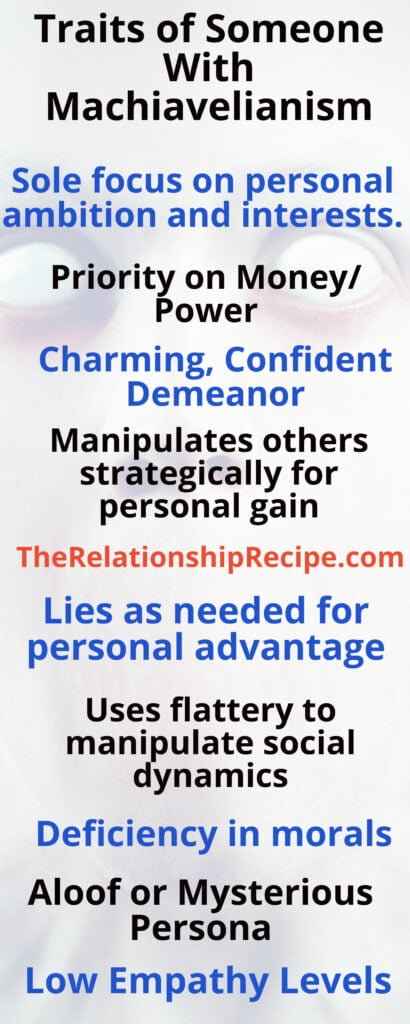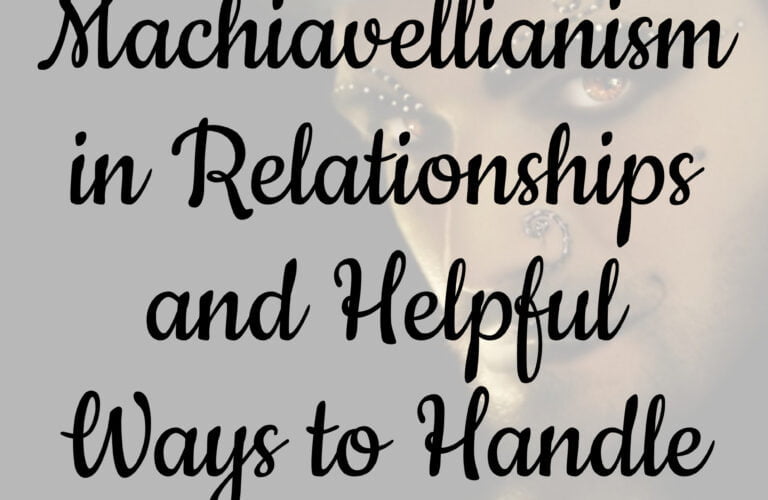Machiavellianism, a term derived from the works of Niccolò Machiavelli, has found its place in modern psychology, particularly within the infamous Dark Triad personality traits.
This intriguing and often controversial behavioral pattern raises numerous questions about its origins, psychological underpinnings, and its impact on various aspects of life, including romantic relationships.
In this comprehensive exploration, we discuss the roots of Machiavellianism, its connection to the Dark Triad, and its influence on interpersonal relationships.

Understanding Machiavellian Behavior
Machiavellianism, as a trait, is characterized by manipulation, cunning, and a strategic approach to social interactions. Individuals who exhibit Machiavellian behavior prioritize their own interests and are willing to manipulate others to the nth degree to achieve their goals. This behavior often involves deceit, manipulation, and a lack of moral considerations, making Machiavellians adept at navigating complex social scenarios with a focus on personal gain.
In contrast to a psychopath prone to violence, or a narcissist seeking constant attention, a Machiavellian personality tends to be more reserved, channeling their energy into strategic plotting rather than outwardly expressing their intentions.
Someone with this personality disorder will stop at nothing to get what they want! They don’t give one wit who they hurt if it means achieving what they are after. They don’t have regrets, nor do they truly feel any loyalty to anyone.
When I first started looking into this trait, I was reminded of a character on Dynasty (the REAL version from the 1980s — not the remake — I can’t stand those). While nearly all the characters on that very popular show were quite deeply flawed, the one character who stood out as being among the most flawed was Adam, played by Gordon Thomson in 1982.
He was a long-lost son who would stop at nothing to bring a Carrington baby in to the world, thus securing his spot forever in that very rich family. His focus on this goal was laser-like, and I guess that is what stood out the most to me because I am always playing armchair psychologist. In fact, I think his character had several dark personality traits, including psychopathy, but I digress…
If you weren’t a Dynasty fan, then J.R. Ewing from Dallas also fits the bill!

Origins of Machiavellianism:
The term originates from Niccolò Machiavelli, a 16th-century Italian political philosopher, whose book “The Prince” delved into the strategic and pragmatic aspects of leadership.
Machiavelli’s work explored the idea that leaders should be willing to use cunning and manipulation for the greater good of their statesmanship. Over time, this philosophy evolved into the psychological concept of Machiavellianism, highlighting a personality trait characterized by cunning, manipulation, and a surgical precision focus on achieving personal objectives at any cost.

Machiavellianism and the Dark Triad
Machiavellianism is often grouped with two other dark personality traits – narcissism and psychopathy – forming what is known as the Dark Triad. While each trait has distinct features, they share commonalities such as manipulation, lack of empathy, and a focus on self-interest. The Dark Triad represents a cluster of socially aversive traits that, when combined, create individuals with a particularly challenging and often destructive interpersonal style.

What are the Traits of Someone With Machiavellianism?
Ambition and Self-Interest:
Sole focus on personal ambition and interests.
Priority on Money and Power:
Prioritizes wealth and power over interpersonal relationships.
Charming and Confident Demeanor:
Projects charm and confidence to manipulate perceptions.
Exploitation and Manipulation:
Exploits and manipulates others strategically for personal gain.
Deceptive Practices:
Engages in lying and deception as needed for personal advantage.
Flattery Usage:
Utilizes flattery frequently to manipulate social dynamics.
Lack of Principles and Values:
Demonstrates a deficiency in moral principles and values.
Aloof or Mysterious Persona:
May come across as aloof or challenging to truly understand.
Cynicism Towards Morality:
Holds a cynical perspective towards goodness and morality.
Harmful Actions for Personal Gain:
Capable of causing harm to others to achieve personal goals.
Low Empathy Levels:
Exhibits low levels of empathy towards others.
Avoidance of Commitment:
Tends to avoid commitment and emotional attachments.
Patient Calculative Nature:
Displays patience due to a calculated and strategic mindset.
Concealed True Intentions:
Rarely reveals genuine intentions, maintaining secrecy.
Inclination Towards Casual Encounters:
Prone to engaging in casual sexual encounters.
Social Situational Awareness:
Proficient in reading social situations and understanding others.
Lack of Warmth in Interactions:
Demonstrates a lack of warmth in social interactions.
Unawareness of Consequences:
Not always conscious of the potential consequences of actions.
Emotional Identification Struggles:
Might find it challenging to identify and express personal emotions.

Machiavellianism’s Impact on Relationships:
Romantic relationships can become intricate landscapes when a partner exhibits Machiavellian tendencies. The strategic manipulation and lack of empathy associated with Machiavellianism can lead to challenges in maintaining trust and fostering emotional intimacy. Machiavellians may engage in deceitful behaviors to control or exploit their partners, causing emotional distress and undermining the foundations of a healthy relationship.

Handling Machiavellianism in Relationships
My advice? Run far and fast! At the very least avoid these people at all costs whenever possible.
Handling Machiavellianism in relationships can be challenging, given the manipulative and strategic nature of individuals exhibiting this trait. If you find yourself dealing with a partner who displays Machiavellian behavior, consider the following strategies:
- Maintain Awareness:
- Recognize the Signs: Educate yourself about the characteristics of Machiavellianism. Awareness is the first step in dealing with manipulative behavior.
- Trust Your Instincts: If something feels off or manipulative, trust your instincts and don’t dismiss your feelings.
- Establish Boundaries:
- Define Clear Boundaries: Clearly communicate your boundaries and expectations in the relationship. Machiavellians may test limits, so having well-defined boundaries is crucial.
- Be Assertive: Stand firm in enforcing boundaries. Machiavellians may attempt to push boundaries, and being assertive helps maintain a healthy balance.
2. Prioritize Communication:
- Open Dialogue: Encourage open and honest communication in the relationship. Establish a safe space for discussing concerns and feelings.
- Clarify Expectations: Clearly communicate your expectations and ensure your partner understands the importance of trust and transparency.
3. Evaluate Trustworthiness:
- Verify Information: Given the potential for deceit, verify information independently when possible. This helps in ensuring transparency and honesty.
- Assess Consistency: Evaluate the consistency of your partner’s words and actions. Machiavellians may present inconsistencies that reveal manipulative behavior.
4. Seek Support:
- Confide in Trusted Friends: Share your concerns with friends or family members you trust. External perspectives can provide valuable insights and support.
- Professional Guidance: Consider seeking the help of a therapist or counselor experienced in dealing with manipulative behavior. They can offer guidance and strategies for navigating the relationship.
5. Self-Care:
- Emotional Well-being: Prioritize your emotional well-being. Maintain activities and connections that bring you joy and fulfillment.
- Set Realistic Expectations: Understand that changing Machiavellian behavior may be challenging. Focus on setting realistic expectations for the relationship.
6. Document Behavior:
- Keep a Record: If manipulation or deceit becomes a pattern, consider keeping a record of specific instances. This documentation may be useful for self-reflection and potential future discussions.
7. Consider Relationship Dynamics:
- Evaluate the Relationship: Assess the overall health and satisfaction in the relationship. If the negative aspects outweigh the positive, consider the impact on your well-being.
- Explore Alternatives: If the manipulative behavior persists, explore the possibility of seeking a healthier relationship or considering separation.
8. Educate Yourself:
- Learn Coping Strategies: Equip yourself with coping strategies for dealing with manipulative behavior. Understanding how Machiavellians operate can empower you to navigate challenges more effectively.
9. Know When to Seek Help:
Trust Your Judgment: If you feel consistently manipulated or emotionally distressed, trust your judgment. Knowing when to seek professional help or consider ending the relationship is crucial for your well-being.
Remember that dealing with Machiavellianism requires careful consideration of your own needs and well-being. Seek support, prioritize open communication, and make decisions that align with your values and emotional health. If the manipulative behavior persists, it may be necessary to reassess the viability of the relationship.

Questions Surrounding Machiavellianism:
- Is Machiavellianism a Mental Illness?
Machiavellianism, unlike mental illnesses classified in diagnostic manuals, is considered a personality trait. It falls within the realm of normal personality variations rather than being categorized as a mental disorder. However, extreme manifestations of Machiavellian behavior can lead to significant interpersonal and societal consequences, raising ethical and moral concerns.
- Do Machiavellians Have Empathy?
Empathy, the ability to understand and share the feelings of another, is often diminished in individuals with high levels of Machiavellianism. While they may possess cognitive empathy, allowing them to understand emotions intellectually, their affective empathy, which involves sharing emotional experiences, is typically lacking. This deficit in empathy contributes to their willingness to exploit and manipulate others without emotional remorse.
- Real-Life Examples of Machiavellianism:
One real-life example of Machiavellianism can be observed in certain political figures known for their strategic manipulation and cunning approach to power dynamics. Machiavellian leaders often prioritize their political survival over moral considerations, utilizing manipulation and deceit to achieve their objectives.
- More Examples in Mainstream TV Shows:
Machiavellian characters are frequently portrayed in mainstream TV shows, captivating audiences with their intricate personalities and Machiavellian tactics. Characters like Frank Underwood in “House of Cards” and Cersei Lannister in “Game of Thrones” exemplify Machiavellian traits, using manipulation and cunning to navigate complex political landscapes.
- Machiavellianism Among Historical Figures:
Historical figures such as Richard Nixon, known for his involvement in the Watergate scandal, exemplify Machiavellian tendencies. Nixon’s use of deceit and manipulation to cover up political misdeeds reflects a Machiavellian approach to leadership, putting personal interests above ethical considerations.

Machiavellianism, with its roots in political philosophy, has found its way into contemporary psychology, forming a significant part of the Dark Triad personality traits. As we navigate the complexities of Machiavellian behavior, its impact on romantic relationships, and its presence in various aspects of society, we gain insights into the intricate nature of human personality.
The exploration of Machiavellianism prompts us to consider the ethical implications of such traits and how they shape our understanding of interpersonal dynamics in both fictional and real-world scenarios.

This post may contain affiliate links. I earn from qualifying Amazon purchases at no extra cost to you.




